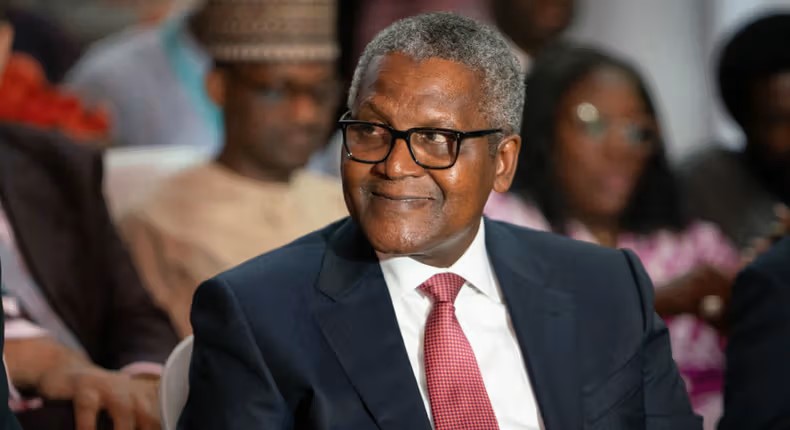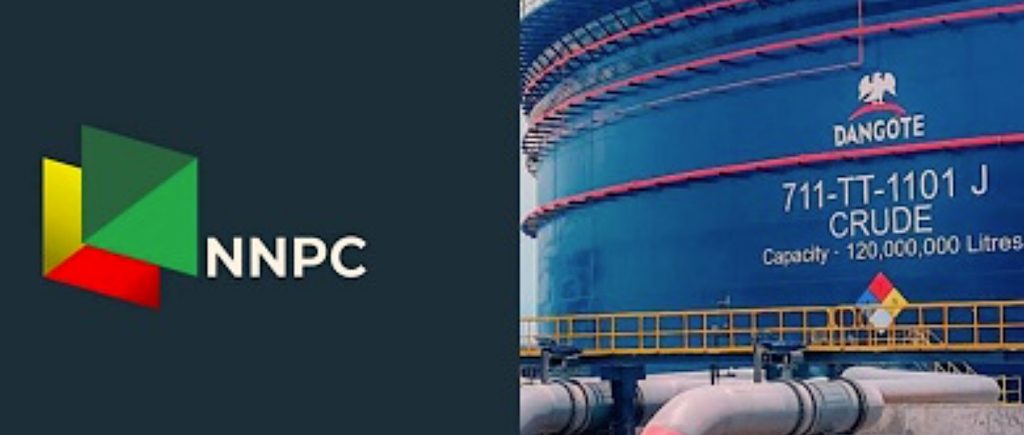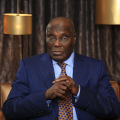Business
NNPC Considers Refinery Sale After Dangote’s Take
Published
7 months agoon

Bayo Ojulari, Group Chief Executive Officer of the Nigerian National Petroleum Company Limited (NNPC), has seemingly affirmed recent concerns raised by Alhaji Aliko Dangote regarding the future of Nigeria’s state-owned refineries in Port Harcourt, Warri, and Kaduna.
Ojulari disclosed that the company is now weighing the possibility of selling off the refineries, citing ongoing rehabilitation efforts that have failed to deliver meaningful progress. He attributed the challenges to the aging and outdated nature of the facilities, which have rendered restoration efforts largely ineffective.
Speaking on Thursday during an interview with Bloomberg in Vienna, Austria, Ojulari echoed Dangote’s earlier remarks, where the industrialist expressed skepticism that the NNPC-operated refineries would ever return to full operation — despite consuming nearly $18 billion in rehabilitation funding over the years.
Ojulari acknowledged that, despite significant investments, the country has seen little in terms of operational output from the refineries, prompting a reassessment of their long-term viability.

Ojulari’s remarks mark a notable departure from the assurances given by his predecessor, who had confidently stated in November 2024 that all government-owned refineries would return to full operational capacity.
During an interview with Bloomberg at the 9th OPEC International Seminar on Thursday, Ojulari revealed that the Nigerian National Petroleum Company Limited (NNPC) is currently conducting a comprehensive review of its refinery strategy. The outcome of this review, he said, is expected by the end of the year.
“We’re reassessing all our refinery plans at the moment. By year-end, we anticipate wrapping up that process, which may lead us to adopt a different approach,” Ojulari stated.
When asked whether NNPC would consider selling off its refineries, Group CEO Bayo Ojulari acknowledged that the option is very much on the table. “We’re not ruling out a sale,” he said. “All options are being considered, but any final decision will depend on the outcome of the ongoing strategic review.”
Ojulari, much like business magnate Aliko Dangote, pointed to outdated infrastructure and inefficient technology as major obstacles in efforts to revive the refineries. “Over the years, we’ve poured significant investment into the refineries and introduced new technologies, but the results have fallen short,” he admitted.
He explained that part of the difficulty lies in trying to modernize facilities that have long been dormant. “When you attempt to rehabilitate aged, neglected refineries, the process becomes increasingly complex and unpredictable,” he said.
Ojulari assumed leadership of NNPC in April, following the removal of his predecessor, Mele Kyari, by President Bola Tinubu. Kyari had overseen major rehabilitation projects and repeatedly assured the public that the refineries would be fully restored.
However, skepticism about the viability of those promises continues to grow. Speaking on Thursday at his Lekki refinery while addressing members of the Global CEO Africa group from the Lagos Business School, Alhaji Aliko Dangote cast doubt on whether the government-owned refineries would ever become operational again.
Dangote expressed disappointment over the massive public investment in the refineries — estimated at around $18 billion — that has failed to yield any tangible output. In contrast, he highlighted the progress made at his privately owned 650,000-barrel-per-day refinery, noting that over 50% of its production capacity is now dedicated to Premium Motor Spirit (petrol). By comparison, government-owned refineries only allocated about 22% of their output to petrol production.
Dangote recounted how he and his team were compelled to hand back control of the government-owned refineries shortly after President Olusegun Obasanjo left office in 2007.
He explained that the transfer occurred just a few months into President Umaru Musa Yar’Adua’s administration, following claims by refinery officials that the previous sale had been undervalued and possibly influenced by favoritism.
“The refineries we acquired in January 2007 were producing only about 22 percent of Premium Motor Spirit (PMS),” Dangote said. “But due to the change in government, we were asked to return them. The then Managing Director persuaded President Yar’Adua that the facilities could still be revived, so we stepped back.”
Dangote recalled how critics at the time claimed the refineries were handed to his team as a “parting gift” from the outgoing Obasanjo administration. Reflecting on the situation today, he expressed deep skepticism about the viability of the facilities, noting that despite the government spending an estimated $18 billion on them, they remain non-functional.
“I honestly don’t believe they will ever work,” Dangote said, casting doubt on the long-term prospects of reviving the aging plants.
He compared the ongoing refurbishment efforts to retrofitting a decades-old vehicle with modern technology — an endeavor, he argued, that is both impractical and ineffective. “It’s like trying to modernize a 40-year-old car in a world where everything has changed. Even if you replace the engine, the car’s frame won’t be able to handle the strain of today’s technology,” he explained.
Dangote’s comments align with earlier remarks made by former President Olusegun Obasanjo, who in 2024 questioned the rationale behind investing further in the refineries. Obasanjo had revealed that even major international oil firms like Shell had declined to operate the facilities when he approached them during his presidency — a signal, he suggested, that their long-term value was doubtful.
Notably, two of the refineries that were declared operational by former NNPC Group Managing Director Mele Kyari in late 2024 have since been shut down once again, reinforcing concerns about the sustainability of the state-run facilities.
Former President Olusegun Obasanjo has once again voiced his frustration over the state of Nigeria’s publicly-owned refineries, highlighting how a $750 million deal—once accepted by his administration to hand the facilities over to private investors including Aliko Dangote—was reversed by his successor, the late President Umaru Musa Yar’Adua.
Obasanjo recalled warning Yar’Adua against canceling the sale, arguing that the Nigerian National Petroleum Company (NNPC) lacked the capacity to revive the outdated facilities. “I went to him and said, ‘This isn’t right.’ He replied, ‘NNPC says they can handle it.’ I told him directly: ‘They cannot.’ Based on what I knew then, and even now, I told him those refineries wouldn’t work—and when you eventually try to sell them, not even as scrap would they fetch $200 million,” Obasanjo recounted.
The former president criticized the motivations behind the reversal, attributing it to entrenched corruption. “NNPC officials knew the refineries were beyond recovery, but they were more interested in sustaining the corrupt practices tied to them. When capable investors showed interest, they were blocked. In a society governed by accountability, those responsible should be in prison,” he stated.
Speaking again in January, Obasanjo lamented how over $2 billion had been wasted on the refineries since the failed transaction, yet there was nothing to show for it. He underscored the credibility of international players like Shell, who had earlier declined his invitation to take over refinery operations due to the unviable condition of the assets. “If Shell says something won’t work, I believe them. If the refineries are truly operational, why is the country now relying on Aliko Dangote? He will make his refinery work—efficiently and profitably,” he added.
Obasanjo ended with a Yoruba proverb that likened exaggerated refinery performance claims to a farmer who boasts of planting 200 yam heaps but has only cultivated 100. “When he harvests 100 yams, he also ends up with 100 lies,” he quipped.
Calls for the privatisation of the refineries have grown louder, especially after the recent shutdown of the 60,000 barrels-per-day Port Harcourt refinery—just six months after it was declared operational. Similarly, the Warri refinery ceased operations just a month after former NNPC Group CEO Mele Kyari announced its reopening in December.
The Manufacturers Association of Nigeria has criticized the continued investment in these facilities, describing them as economic liabilities and urging the Federal Government to sell them off. Industry experts, including independent crude refiners, have echoed the sentiment, suggesting that the facilities be scrapped and the proceeds redirected toward modular refinery development.
Despite repeated assurances and financial injections, the refineries remain non-functional. According to reports, the government approved $1.4 billion for the Port Harcourt refinery’s rehabilitation in 2021, with $897 million and $586 million allocated to the Warri and Kaduna plants, respectively. In the same year, N100 billion—amounting to over N8 billion monthly—was reportedly spent on repairs. Between 2013 and 2017 alone, $396.33 million went into Turnaround Maintenance. Yet, no refinery is currently producing fuel.
You Might Also Like These
 Benue Killings: Atiku Urges FG To Take Urgent Action
Benue Killings: Atiku Urges FG To Take Urgent Action
 Tiwa Savage Makes Mouth-Opening Revelation About Game of Thrones
Tiwa Savage Makes Mouth-Opening Revelation About Game of Thrones
 IGP Egbetokun Promises To End Benue Killings
IGP Egbetokun Promises To End Benue Killings
 U.S Successfully Attacked Three Iran Nuclear Sites – President Trump
U.S Successfully Attacked Three Iran Nuclear Sites – President Trump
 Supreme Court nullifies Orji Uzor Kalu’s conviction
Supreme Court nullifies Orji Uzor Kalu’s conviction
 Stop coming to my inbox to demand that I give you my hard-earned money – Former Lagos Governorship aspirant, Babatunde Gbadamosi tells online beggars
Stop coming to my inbox to demand that I give you my hard-earned money – Former Lagos Governorship aspirant, Babatunde Gbadamosi tells online beggars
 Don’t Treat Us Like Conquered People, PDP Warns APC
Don’t Treat Us Like Conquered People, PDP Warns APC
 Cristiano Ronaldo Renews Contract With Real Madrid
Cristiano Ronaldo Renews Contract With Real Madrid
 COVID-19: NCDC denies claim of officials rejecting people for testing
COVID-19: NCDC denies claim of officials rejecting people for testing
 ‘Boko Haram’ kill Nigeria vigilantes
‘Boko Haram’ kill Nigeria vigilantes
 COVID-19: Nigeria moves to evacuate citizens abroad
COVID-19: Nigeria moves to evacuate citizens abroad
 Coronavirus: Gov. Ishaku closes down Taraba borders
Coronavirus: Gov. Ishaku closes down Taraba borders
